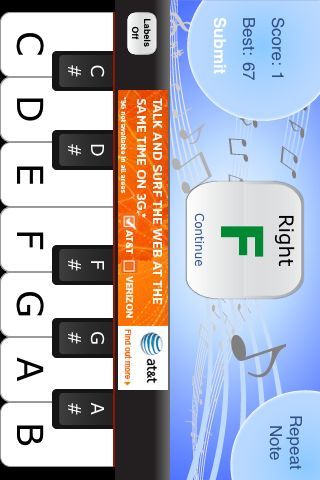Then I gave up and watched a TED talk from 2007 by Jeff Hawkins on how brain science will change computing. This got me thinking in a new direction about acquiring absolute pitch.
Treo creator Jeff Hawkins urges us to take a new look at the brain -- to see it not as a fast processor, but as a memory system that stores and plays back experiences to help us predict, intelligently, what will happen next.
The memory-prediction framework is a theory of brain function that was created by Jeff Hawkins and described in his 2004 book On Intelligence. This theory concerns the role of the mammalian neocortex and its associations with the hippocampus and the thalamus in matching sensory inputs to stored memory patterns and how this process leads to predictions of what will happen in the future.
According to Jeff, my brain is good at learning sequences because the primary function of my neo-cortex is to predict things. This explains why my brain never bothered to store exact pitches. It was more adaptive and intelligent to have good relative pitch. That way, I could sing in tune with an out of tune group and "fit in" socially and musically.
As a musician, I've spent most of my life playing and singing in tune with whatever instrument is at hand, not caring about absolute pitch as long as the instrument I played was tuned to itself.
Still, I'm driven by challenges.
Can I learn a fundamentally new way of hearing after twenty years?
Can the memory-prediction framework help me learn absolute pitch? I'm going to sleep on that and see if my subconscious can tell me the answer to how to program my brain.
A bit more reading show another interesting theory, that absolute pitch may not require any new learning. This is why I can't seem to learn it. It may instead require blocking something I have already learned.
Absolute pitch accessible to everyone by turning off part of the brain?TERRY BOSSOMAIER and ALLAN SNYDER
The authors argue that infants are all born with absolute pitch and that this is suppressed in most people as we learn language. Some people who are exposed to musical instruments when they are learning language are tricked into developing special language centers for musical tones.
Perhaps brain stimulation, the authors argue, can unleash absolute pitch ability. They base this idea on the fact that TMS (Transcranial Magnetic Stimulation) applied
"to the left frontotemporal lobe enabled normal individuals to exhibit savant-like skills in drawing and in proofreading. Such magnetic stimulation is known to inhibit the normal functioning of localised regions of the brain..."
As yet no area in the brain has been identified which could be suppressed and would then unleash absolute pitch skills.
This brings me back to a point I've considered in the past. To what degree can we consciously disable our own memories?
I know it is possible, with hypnosis, and perhaps with self-hypnosis to have a negative visual hallucination, where you can not see something that is really in your environment. This kind of control would help with my supposedly incurable tinnitus.
I looked up "conscious forgetting" and found these tidbits:
Conscious forgetting means willfully dropping the practice of obsessing, intentionally outdistancing and losing sight of it, not looking back, thereby living in a new landscape, creating new life and new experiences to think about instead of the old ones. This kind of forgetting does not erase memory, it lays the emotion surrounding the memory to rest.”Anderson and Gabrieli discovered that when people consciously determine not to think about something they do not want to remember, their ability to recall that memory gradually weakens. - link
"If you consistently expose people to a reminder of a memory that they don't want to think about, and they try not to think about it, they actually don't remember it as well as memories where they were not presented with any reminders at all."- link
Great, so I just have to figure out what it is that I want to forget that will let me recall pitches.

1 comment:
Well, I have a tip or two for you that doesn't involve consciously forgetting anything: try memorizing one note on the piano. One note, one octave. If you can do that, you can figure out what other pitches are without a piano. Alternatively, if you can't memorize the note for all time, try memorizing it every day by playing a note on the piano every morning (always the same note). That way, it'll be like you have perfect pitch all day, but you don't have to keep it memorized forever.
Post a Comment